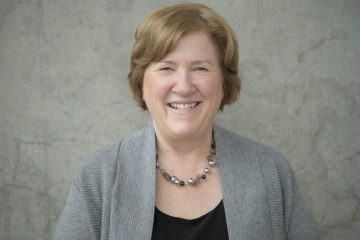Biography
As CEO of the Rick Hansen Foundation (RHF), Doramy Ehling champions the organization’s vision of an inclusive world where people with disabilities are living to their full potential. Doramy takes great pride in steering the development of several programs at RHF that break down barriers to improve the lives of millions of Canadians. RHF’s primary initiatives include the Rick Hansen Foundation School Program (RHFSP) that teaches youth about the value of diversity and inclusion and the Rick Hansen Foundation Accessibility Certification™ (RHFAC) program, which trains and designates professionals to rate the meaningful accessibility of buildings to enable everybody to go everywhere.
Before joining the Foundation, Doramy spent 27 years in high-performance sport for several national multi-sport organizations and with the Government of Canada/Sport Canada, where she worked with the Federal Secretariat on the Vancouver 2010 Olympic and Paralympic Games. Doramy also collaborated on several major policy initiatives, including the National Sport Policy, Federal Hosting Policy, Policy on Sport for Athletes with Disabilities, and Policy on Aboriginal Peoples’ Participation in Sport.
With the belief that sport is an excellent tool for social inclusion, Doramy has held various volunteer positions with sport organizations over the past 30 years. She is currently serving as Chair for the Host Committee of the National Women’s Volleyball Training Centre at the Richmond Olympic Oval in British Columbia and is the President of Volleyball BC.
She is a member of the Advisory Board of the Diversity Institute at Ryerson University and a member of the Greater Vancouver Board of Trade’s Advisory Committee of the Diversity and Inclusion Leadership Council. Doramy collaborated with other disability organizations as part of the Federal Accessibility Legislation Alliance that pushed for the historic Accessible Canada Act and the Pan-Canadian Disability Coalition that spearheaded the movement to secure supports for Canadians with disabilities during the Covid-19 pandemic.
Meeting Doramy
What is your most memorable experience from your time in the Faculty of Education?
I was very fortunate to be at UBC during a time when they started to embrace the engagement of First Nations elders in the shaping of future teachers as part of my BEd. We had an elder from Nisga’a who would sit in the centre of the classroom with us in a circle, which was the complete antithesis of your typical university classroom structure in the early 1980s. It was my favorite class. His stories were so interesting as he wove tales about cultural history and spoke about how important it was to create an inclusive classroom. This approach was so revolutionary for its time. It really opened my eyes to the world around me as a 20-year-old and sowed the seeds of what my responsibility was as an educator and, beyond the classroom, how to create social inclusion. That class was a life-changing experience and set the tone for what was to come.
Where has your education from the Faculty of Education taken you in your career?
While I was a student at UBC I was also involved in basketball and volunteered with the athletics department at UBC. I was the manager of the women’s varsity basketball team, a team that struggled on the court and was often on the losing end of the score. But we had a lot of fun! I was asked to be a part of the national volleyball team program as a manager in Ottawa and, at the same time, was accepted into law school. I picked volleyball!
Prior to my years in Ottawa, I was an elementary school substitute teacher for the Vancouver School Board. Those lessons of inclusion I learned from my time as an education student at UBC formed the core of my work in sport and in education. It doesn’t matter if you’re a leader of an organization or a member of a team it is important to approach your role through an inclusive lens. I always tried my best to apply that value in everything I do, from volunteering with athletes in a gym to leading in the boardroom.
Where do issues of inclusion find a place in your life or at work?
I was interested in working with RHF because of its vision of building an accessible and inclusive Canada. Rick Hansen also went to UBC and studied kinesiology, intending to be a high school gym teacher and coach. Rick had a love of sport that linked back to the community and I felt a real kinship with that because of my work as a community volunteer and with high-performance sport. We both see the importance of education because that’s how you create champions for change. Teachers play such a key role by encouraging their students to act on issues that matter, they teach them to become leaders in creating an accessible and inclusive world. I am 100 percent behind Rick’s vision of creating inclusive education because I have seen the positive impact it has in the classroom and in the community. So much so that this past year we pivoted our RHF School Program resources to an online format so educators could still show children and youth the value of diversity and inclusion no matter from where they were teaching.
Do you have any words of wisdom for current students? Newly graduated folks?
I encourage future educators to create a positive and inclusive environment for students. When your students are in a comfortable place and feel valued and respected, their ability to learn is elevated. I would also suggest that you always be open to new ideas and listen and learn from your students. They will bring more to you than you will ever know. I have so much gratitude for those who pursue this profession as you will make a positive and enduring impact that children and youth will carry with them for the rest of their lives.
